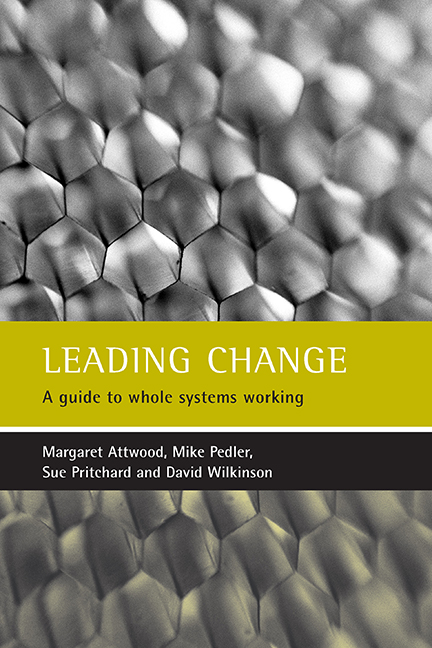Book contents
- Frontmatter
- Contents
- Foreword
- Foreword
- Prologue
- one Why do we need whole systems change?
- Two How Do We Put These Fine Words Intoaction? An Overview of Whole Systems Development
- Three The emerging practice of wholesystems development
- Four Leadership: keeping the big picture in view
- Five Public learning
- Six Valuing difference and diversity: getting the whole systeminto the room
- Seven Meeting differently: large and small group working
- Eight Follow-through and sticking with it
- Nine From organisations to networks
- Ten Confirming cases: local problems andlocal solutions within whole systems
- Epilogue
- Bibliography
- Index
Ten - Confirming cases: local problems andlocal solutions within whole systems
Published online by Cambridge University Press: 20 January 2022
- Frontmatter
- Contents
- Foreword
- Foreword
- Prologue
- one Why do we need whole systems change?
- Two How Do We Put These Fine Words Intoaction? An Overview of Whole Systems Development
- Three The emerging practice of wholesystems development
- Four Leadership: keeping the big picture in view
- Five Public learning
- Six Valuing difference and diversity: getting the whole systeminto the room
- Seven Meeting differently: large and small group working
- Eight Follow-through and sticking with it
- Nine From organisations to networks
- Ten Confirming cases: local problems andlocal solutions within whole systems
- Epilogue
- Bibliography
- Index
Summary
At 3.00am in the morning of 30 October 2000 the River Aire startedto flood the Stockbridge neighbourhood of Keighley. Stockbridge is a relatively poor, ethnically mixed community. The housing stock consists of mostlyVictorian terraced houses and budget-priced 1930s semis, privately owned or rented. There is also a small amount of relatively new housing built on the flood plain, both privately and housing association owned. For the most part, it is a relatively low paid community.
Some people had about an hour’s warning, others none at all. By 10.00am people were arriving at the Keighley Leisure Centre (about half a mileaway), where the local authority (Bradford Metropolitan District Council) had set up an emergency response centre. Some arrived without shoes and socks and many were upset and disoriented by the experience. There was also a growing realisation that many had no household insurance.
A total of 292 households were affected. It was to be between 6 and 12 months before people were back in their homes. Not only was this a traumaticevent for individuals, it was a traumatic event for a fragile community. What happened next is a very positive story of what frontline interagency collaboration and fully involving local people, can achieve.
The story of the floods at Stockbridge illustrates how global problems areexperienced locally. It is not the citizens of Stockbridge (or Bangladesh) who have created the conditions which have submerged them, but they arenonetheless the main victims and those with the greatest interest in doing something about these conditions. There is also a responsibility on the public authorities within which these events occur to ensure they also learn from theexperience. It may be said that this is a huge problem – what does it have to do with local people and local solutions? It is of course true that issues of globalwarming must be tackled at a global level, and questions of flood defence at anational level, but these problems are experienced essentially at a local level, and their local solution is critical to sustainable development. This chapter makes the case for whole systems development as a methodology for combiningthe various levels at which action is needed, with local involvement andsustainable improvements at local level where the problems are experienced.
- Type
- Chapter
- Information
- Leading ChangeA Guide to Whole Systems Working, pp. 163 - 182Publisher: Bristol University PressPrint publication year: 2003



